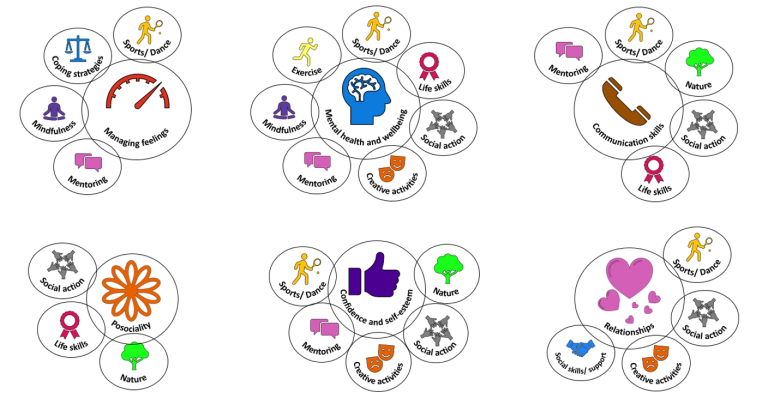Responsive Facility: A review of the effectiveness of community-based and out of education interventions in promoting the mental health and wellbeing of 11–25 year-olds (June - November 2022)
Research Team
Professor Jessica Deighton, Professor Julian Edbrooke-Childs, Dr Kylee Trevillion, Profossor Sonia Johnson, Dr Jenny Woodman
Themes
Responsive Facility, Mental Health Policy Research Unit
Why we did this study
The prevention of mental health difficulties and promotion of wellbeing for young people is crucial so they are supported to be healthy and happy. This period is also important for preventing difficulties later in life. Interventions provided in educational settings have been widely researched, but less is known about such interventions provided outside of educational settings. The aim of this study was to synthesise existing evidence on interventions for promoting mental health and wellbeing provided outside of educational settings for young people 11 to 25 years.
Our experts by experience described the importance of mental health promotion interventions provided outside of educational settings. These interventions provide support for young people who are not in education and those communities who might not have opportunities to connect in schools (e.g., Black young people, LGBTQIA+ young people, neurodivergent young people). These interventions provide a space away from a setting in which young people may be experiencing challenges, making it easier for young people to acknowledge if things are difficult and to open up. This might be particularly useful when bringing together young people who are struggling with similar things. Interventions outside of educational settings were also described as beneficial as they would encourage young people to leave the house.
About the review
- We found evidence of positive impacts on mental health and wellbeing for interventions that involved exercise, sports/dance, life skills, social action projects, creative activities, mentoring, and mindfulness-based interventions.
- There was relatively little focus and/or analysis of inequalities in access, engagement, and impact in the included reviews and primary studies. However, the social action projects in the included review were generally focused on disadvantaged areas and marginalised groups of young people (e.g., minoritised ethnic groups).
- A range of factors that help and hinder access to and engagement with mental health promotion interventions were identified. In addition to what the intervention is, how the intervention is delivered is also important.
Figure 1. Summary of main findings of positive impacts (Large, central circles are outcomes. Small, peripheral circles are interventions with evidence of positive impacts on that outcome)

Implications of these findings
There is an urgent need for more interventions (and research), beyond social action based projects, to be developed and evaluated with young people from marginalised groups.
Further research is needed on:
- Working with specific communities is needed to understand what they would like from such interventions, what existing support is being used, and how they think such support should be developed.
- The impacts of accessible and inclusive mental health promotion interventions outside of education, which is complicated by the inconsistent provision of such interventions. However, as we heard from young people, it is also important that such provision is consistent, to avoid such interventions (and their impacts) being transitory.
- How to implement and engage young people with mental health promotion interventions outside of education. This research should focus on how to make the interventions engaging for young people, considering the factors identified in this report on what helps and hinders engagement.
Related to engagement, it was clear from young people that how an intervention is delivered is important in addition to what the intervention is. For example, interventions that are friendly and welcoming, young person led, and authentic (e.g., led by and/or provide the ability to interact with people with relevant lived experience) are important facilitators to engagement.
The ability to choose between different interventions based on individual needs and preferences may be a challenge because options will be constrained by what is available in the local community. Findings particularly from the grey literature and consultations with young people suggest that these constraints are likely to disproportionately impact young people from marginalised groups, for example for whom it may be less possible to travel to interventions further away.
 Close
Close

